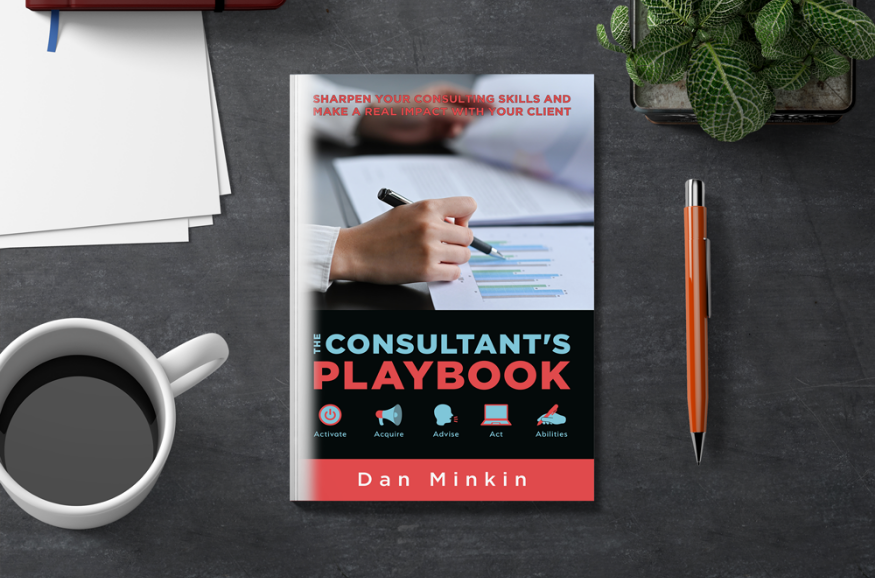The Consultant’s Playbook Chapter 5 – Abilities
The Consultant’s Playbook Chapter 5 – Abilities. In this final Chapter you will learn about “Soft skills”, a fundamental part of the playbook of the consultant.
Whilst you need expert skills, you also need to develop a range of personal skills if you want to succeed in consultancy. These “soft skills” have been grouped into the following broad categories: Communication, Problem Solving, Self-Management and Working with Others, and you will find yourself using a wide range of them over any given assignment. Whilst you do not need to be exceptional across the board, it is important that you work to reduce any weaknesses until they are no longer liabilities.
The four elements of Abilities, are Communication, Problem Solving, Self-Management and Working with Others.
 Communication is the art of understanding and being understood. Good communication occurs when both parties agree that the message being sent is the same as the one being understood. The four skills you can learn about are:
Communication is the art of understanding and being understood. Good communication occurs when both parties agree that the message being sent is the same as the one being understood. The four skills you can learn about are:
- Listening – this involves understanding the message, the situation, and the people.
- Speaking – focusing on content and style, aiming for confidence, clearness and variety.
- Writing – meeting a professional standard, including being accurate, concise and complete.
- Presenting – combining the three elements above (listening, speaking and writing).
 Problem Solving using different types of thinking is in many ways the fundamental reason that consultants exist, and it is an activity that is performed, on a daily basis. To make the best decision or determine the best course, consultants may need to vary their type of thinking. Understanding this allows you to move between whichever cognitive activities are required at a given point. In turn, this increases your effectiveness as a consultant. Three of the most important thinking types for consultants are:
Problem Solving using different types of thinking is in many ways the fundamental reason that consultants exist, and it is an activity that is performed, on a daily basis. To make the best decision or determine the best course, consultants may need to vary their type of thinking. Understanding this allows you to move between whichever cognitive activities are required at a given point. In turn, this increases your effectiveness as a consultant. Three of the most important thinking types for consultants are:
- Analytical thinking – a methodical step-by-step approach to thinking that allows you to break down complex problems into single and manageable components.
- Critical thinking – a cognitive activity where other people’s beliefs and statements on an issue are identified and the strength and logic of their positions assessed.
- Holistic or systems thinking – an ability to see the big picture, manage multiple inputs and variables, and identify patterns and possible options before using this information to create a solution.
The ability to use the right kind of thinking at the right time will lead to effective problem solving.
 Self-Management skills help you get the best out of yourself in the variety of challenging situations that consultancy brings this helps to keep you motivated, confident, and productive. Good self-management means you perform well on a daily basis, across the length of a full engagement, and throughout your career. Managing yourself well leads to a number of positive states, including the following three skills:
Self-Management skills help you get the best out of yourself in the variety of challenging situations that consultancy brings this helps to keep you motivated, confident, and productive. Good self-management means you perform well on a daily basis, across the length of a full engagement, and throughout your career. Managing yourself well leads to a number of positive states, including the following three skills:
- Being motivated – including being adaptable and proactive.
- Being confident – having confidence in your current abilities.
- Being resilient – developing the capacity to recover quickly from difficulties.
 Working with Others, includes teamwork and influence. Consultancy is the interaction of an individual or group with a problem or need, with an individual or group who can help them solve the problem or need. There are three related but distinct concepts that you should familiarise yourself with and practise, they are:
Working with Others, includes teamwork and influence. Consultancy is the interaction of an individual or group with a problem or need, with an individual or group who can help them solve the problem or need. There are three related but distinct concepts that you should familiarise yourself with and practise, they are:
- Teamwork – working alongside others where everyone has a specific role.
- Collaboration – working in a team whilst getting the best out of one another.
- Influence – using techniques and behaviours to encourage individuals to all move in the same direction.
These build on each other and the more senior a consultant you are, the more you need to understand and use all of them.
Interested in finding out more?
To find out more about this Chapter, see the how-to-activities, processes, guidelines, diagrams, and checklists and delve further into The Consultant’s Playbook you can order your own copy from Amazon or buy from any Barnes and Noble store. Just follow this link here

